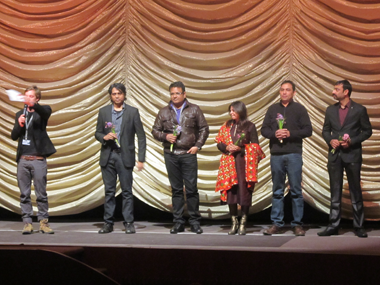By Meenakshi Shedde Manish Mundra is currently one of the hottest angel investors in Indian independent cinema. He’s producing films that most producers would be scared to touch, he donated $83,000 to last year’s Mumbai Film Festival, he’s bringing the Sundance Screenwriters’ Lab to India this April — and as far as Mundra is concerned, he’s just getting warmed up. [caption id=“attachment_2108427” align=“alignleft” width=“380”]  Courtesy: Facebook[/caption] Based in Dubai, Mundra is also the CEO of Indorama Eleme, a Nigeria-based petrochemical company. He has an appetite for risk and that’s proved to be a great blessing for Indian filmmakers who aren’t interested in making masala entertainers. Mundra was in Berlin, fresh from the success of Aankhon Dekhi, Umrika and Dhanak, all of which he either produced or co-produced. Rajat Kapoor’s Ankhon Dekhi, won Best Film (Critics) Award, Best Male Actor (Critics) and Best Story at the Britannia Filmfare Awards. The cherry on Mundra’s cake at the moment is Nagesh Kukunoor’s Dhanak (Rainbow), which won the Grand Prix from the International Jury in the Generation KPlus section for children and a Special Mention by the Children’s Jury in the same section at the Berlin Film Festival. Could you describe your experience of receiving the Grand Prix and Special Mention in the Generation section, as well as the hearty applause from a housefull world premiere for Dhanak at the Berlin Film Festival? Mesmerising…baap re! (Mundra shakes his head in disbelief) You’ve had three back-to-back successes. Do you feel you’ve cracked it? Not at all, I have a lot to learn. First, you have to make good films, then get people to see those films, and finally, see if you can recoup your money. The biggest challenge is the distribution and exhibition of these films, but I’m sure we will crack it. I want to bring the Uber taxi idea to Indian cinema. Like anyone can take any taxi, anyone should be able to hire a hall—say a community hall—and screen a film. But for now, the main thing is to do efficiently budgeted films, between $2,00,000-5,00,000, based on the reach of the film. Basically keep it well below one million dollars, including print and advertising. The initial films may not make money, but later, as we make more films, it will be easy. Give us three-four years. We will build a brand through content-driven films — the people who saw Aankhon Dekhi will come for Dhanak and Umrika. For me, it is a good reward if people watch my films. What are your earliest memories of cinema? I was born in Bihar, and grew up in Jodhpur. In the ’80s, I was very fond of Amitabh Bachchan films like Kala Patthar, Laawaris and Naseeb. I can even sing in Amitabh’s voice. The first film I saw in a theatre was Guide, when I was eight years old. I was mesmerised. Images of Dev Anand and Waheeda Rehman are embossed on my mind. Even if you wake me up in the night, I can recite their dialogues from Guide. We also had to study Guide as a text in our college syllabus, so I’ve had a fascination for film from my early days. We all have to die and go, but if you make good films, they outlive you. My purpose in life is to outlive myself. Money doesn’t matter. We had a big home once, but we had to sell it and move to a smaller house, now I own a big home again. Whatever I’ve achieved is by God’s grace. I’ve risen from the footpath and today, I own a jet. I didn’t do anything, I’m just a conduit. How do you see the indie film space in relation to Bollywood films? The big boys block all the dates and screens, and suffocate small, beautiful films. The older generation was brought up on crap. They will love Action Jackson and Dabangg 1,2,3,4. But the tastes of the younger generation are changing. They see international movies and more conscious of their likes and dislikes. In the last 10-12 months, big crappy films have gone down, despite the stars. So I have entered at the right time, standing by good cinema. Indian producers are generally not very open to international co-productions, and prefer to own the whole film. But you have plunged in with Neeraj Ghaywan’s Masan. Is India really ready for this? Masan (cremation ground) is a story of redemption, about a man who cremates the dead in Benares, and other relationships. It is very close to the reality of Indian life. I’m coproducing the film with Phantom (India) and Arte (France). Initially, I wanted to produce the film myself, but Guneet Monga brought Arte on board. In fact, international co-productions de-risk you, they give you a larger perspective, a bigger market, and more forces to support the film worldwide. Aankhon Dekhi was a beautiful film, but it remained in Indian circles. Masan will go places — I’m hoping it will go to Cannes — that’s the difference that co-productions make. My objective is that Indian cinema must travel. With more partners, it becomes more financially viable and can travel further, and get international credibility. A film like Umrika is realistic —and it is the future of Indian cinema. You have a number of films in the pipeline. Could you tell us about them? I’m producing Anu Menon’s The Waiting (with Naseeruddin Shah and Kalki Koechlin), Manav Kaul’s Tathagat and others. Meenakshi Shedde is South Asia Consultant to the Berlin film Festival, award-winning critic, curator to festivals worldwide and journalist. meenakshishedde@gmail.com
Manish Mundra is currently one of the hottest angel investors in Indian independent cinema.
Advertisement
End of Article
Written by Meenakshi Shedde
Meenakshi Shedde is South Asia Consultant to the Berlin and Dubai Film Festivals and independent curator to festivals worldwide see more


)
)
)
)
)
)
)
)
)



